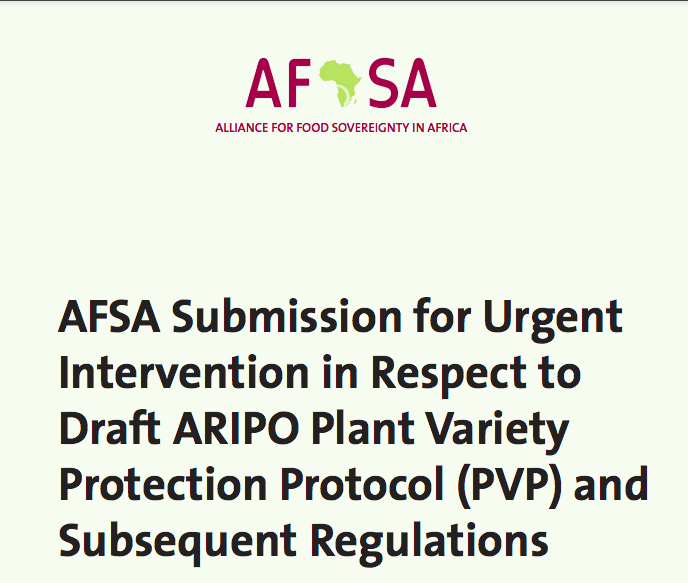Latest Resources

16 June 2014
Slavishly following UPOV 1991: A critique of Mozambique’s PVP law
In this report, the ACB provides a critique of the Mozambique PVP law and concludes that the government of Mozambique has turned a blind eye to its small-scale farmers and their seed and farming systems. The provisions dealing with the exclusive rights granted to plant breeders and the exceptions to those rights render the centuries-old […]

11 June 2014
AFSA Makes Small Gains for Farmers’ Rights in Draft SADC PVP Protocol
AFSA members participated at a SADC Regional Workshop that took place 13-14 March 2014, in Johannesburg, South Africa. The aim of the workshop was to review the draft SADC PVP Protocol. After marathon, highly contentious and difficult discussions, AFSA members were able to persuade member states to amend key provisions in the draft SADC PVP […]

3 April 2014
AFSA strongly condemns sleight of hand moves by ARIPO to join UPOV 1991, bypass national laws and...
The Alliance for Food Sovereignty in Africa (AFSA) [1] strongly condemns the move by the African Regional Intellectual Property Organisation (ARIPO) to join UPOV 1991, which will effectively outlaw the centuries-old African farmers’ practice of freely using, exchanging and selling seeds/propagating material. These practices underpin 90% of the agricultural system within the ARIPO region. [2] […]

20 March 2014
AFSA’s comments on ARIPO’s response to civil society: Draft legal framework for plant...
At the 2013 November meeting of the Administrative Council and Council of Ministers of ARIPO countries held in Kampala, Uganda, several documents on the proposed legal framework for Plant Variety Protection were distributed. Also circulated was a Matrix1 containing ARIPO’s responses to a detailed submission by civil society organisations (CSOs) dated 6th November 2013. In […]

21 October 2013
ARIPO’S Plant Variety Protection law based on UPOV 1991 criminalises farmers’ rights ...
The Alliance for Food Sovereignty in Africa [1] is gravely concerned about a draft law developed under the auspices of the Africa Regional Intellectual Property Organisation (ARIPO), dealing with a harmonised regional legal framework for the protection of plant breeders’ rights, titled “Draft Regional Policy and Legal Framework for Plant Variety Protection”. The ARIPO legal […]

1 October 2013
AFSA Statement Condemning COMESA Approval of Seed Regulations
The Alliance for Food Sovereignty in Africa strongly condemns the approval during September 2013, by the Council of Ministers of the Common Market for East and Southern Africa (COMESA) of the draft COMESA Seed Trade Harmonization Regulations, 2013 (hereinafter referred to as the ‘Seed Regulations’). The COMESA Seed Regulations will greatly facilitate agricultural transformation in […]

3 July 2013
Modernising African Agriculture: Who benefits? Civil Society statement on the G8, AGRA and the Af...
African agriculture is in need of support and investment. Many initiatives are flowing from the North, including the G8’s ‘New Alliance for Food Security and Nutrition in Africa’ and the Alliance for a Green Revolution in Africa (AGRA). These initiatives are framed in terms of the African Union’s Comprehensive African Agricultural Development Programme (CAADP). This […]

8 June 2013
ACB’s comments on the Plant Breeders Rights Bill
We are grateful to the Department of Agriculture, Forestry and Fisheries for allowing us the opportunity to attend the stakeholder workshop on the 22nd of May 2013 and for inviting us to submit our comments on the Plant Breeders’ Rights Bill. We are also pleased to note that the DAFF has indeed taken on board […]

8 June 2013
Comments by the African Centre for Biosafety on SA’s Plant Improvement Bill
According to the United Nations Food and Agricultural Organisation (UNFAO), over the course of the 20th century, 75% of the world’s plant genetic diversity was lost, as local varieties and land races have been replaced with genetically uniform seed. A similar process in animal husbandry has put 53% of all livestock breeds at risk of […]

3 June 2013
G8 “Hunger Summit” initiative rejected by African civil society – Corporate tak...
At the heart of the leading initiatives to ‘modernise’ African agriculture is a drive to open markets and create space for multinationals to secure profits. Green revolution technologies – and the legal and institutional changes being introduced to support them – will benefit a few at the expense of the majority. As world leaders gather […]
